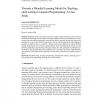Free Online Productivity Tools
i2Speak
i2Symbol
i2OCR
iTex2Img
iWeb2Print
iWeb2Shot
i2Type
iPdf2Split
iPdf2Merge
i2Bopomofo
i2Arabic
i2Style
i2Image
i2PDF
iLatex2Rtf
Sci2ools
124
click to vote
IIE
2008
2008
Towards a Blended Learning Model for Teaching and Learning Computer Programming: A Case Study
Blended learning is becoming an attractive model in higher education as new innovative information technologies are becoming increasingly available. However, just blending face-to-face learning with information technologies cannot provide effective teaching and efficient solutions for learning. To be successful, blended learning must rely on solid learning theory and pedagogical strategies. In addition, there is a need for a design-based research approach to explore blending learning through successive cycles of experimentations, where the shortcomings of each cycle are identified, redesigned, and reevaluated. This paper reports on a study conducted on a blended learning model in Java programming at the introductory level. It presents the design, implementation, and evaluation of the model and its implications for the learning of introductory computer programming.
Related Content
| Added | 12 Dec 2010 |
| Updated | 12 Dec 2010 |
| Type | Journal |
| Year | 2008 |
| Where | IIE |
| Authors | Said Hadjerrouit |
Comments (0)

